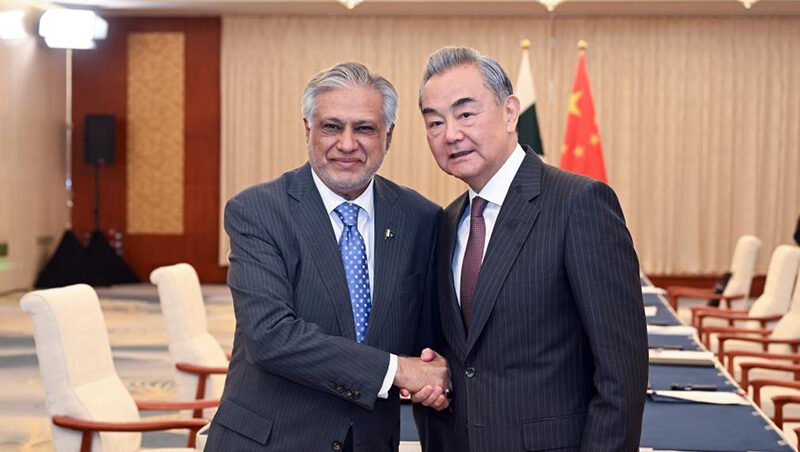Chinese FM Wang Yi Arrives in Islamabad for Official Visit that could reshape the future of Pakistan-China relations. The high-profile trip comes at a pivotal moment as both nations focus on boosting economic ties, strengthening strategic cooperation, and tackling regional security challenges head-on.
‘Iron Brothers’ Look to Take Ties to the Next Level
China and Pakistan often call their relationship an “all-weather strategic cooperative partnership,” and this visit is all about making that bond even stronger. Wang Yi is set to meet Pakistan’s top leadership — including the President, Prime Minister, Foreign Minister, and senior military officials — to discuss everything from trade to security.
Key goals? Reviewing ongoing projects, setting new priorities, and aligning both countries on pressing global and regional developments.
CPEC 2.0: From Roads to Digital Highways
Front and center on the agenda is the China-Pakistan Economic Corridor (CPEC) — the multi-billion-dollar project that has already built roads, ports, and power plants across Pakistan. Now, both sides want to take it further:
- Expanding into agriculture, IT, and green energy.
- Attracting more foreign investment.
- Creating jobs through special economic zones (SEZs).
- Launching digital trade initiatives to connect Pakistan to regional markets.
The second phase of CPEC could be a game-changer if new agreements are signed during this visit.
Regional Security: Afghanistan on the Radar
Beyond economics, security is a major concern. The unstable situation in Afghanistan, cross-border militancy, and terrorism are top priorities for both nations. Wang Yi is expected to hold in-depth discussions with Pakistan’s security chiefs on: READ NEXT https://elevenpakistan.com/death-toll-rises-to-15-as-rain-karachi/
- Counter-terrorism strategies.
- Border security.
- Intelligence sharing.
For Beijing, a stable Afghanistan is not just about peace — it’s critical for the success of CPEC routes passing through western Pakistan.
Backing Each Other on the World Stage
From the UN to global trade forums, China and Pakistan have a long tradition of backing each other’s causes. During this visit, they are likely to reaffirm support on key issues:
- China’s positions on Taiwan and Hong Kong.
- Pakistan’s stance on Kashmir.
They’ll also discuss how to boost their cooperation in multilateral groups like the SCO, BRICS+, and the UN, and share strategies for tackling global challenges like climate change and economic instability.
Trade, Tech & Investment: Pakistan Wants More Access
China is Pakistan’s biggest trading partner, but trade is heavily skewed toward Beijing. Islamabad is expected to push for:
- Greater access for its textiles, minerals, and agricultural exports.
- Easier customs procedures.
- More joint ventures to reduce the trade deficit.
Chinese investors, meanwhile, are eyeing Pakistan’s energy, manufacturing, and mining sectors — and this visit could bring fresh proposals in e-commerce and digital payments too.
Beyond Roads: Tech, 5G & Green Energy in Focus
Infrastructure may be the backbone of China-Pakistan ties, but the future is digital. Talks are expected to explore:
- 5G network rollout.
- Artificial intelligence collaboration.
- Training programs for Pakistani engineers.
- Renewable energy projects including solar, wind, and hydroelectric plants.
Both countries are also committed to cutting carbon emissions and moving toward sustainable energy solutions.
Cultural Ties & Tourism: The Softer Side of Diplomacy
Wang Yi’s visit isn’t just about big business deals. Plans are also in place to:
- Expand student exchange programs.
- Boost Chinese language learning in Pakistan.
- Promote tourism through cultural events and heritage tours.
With Confucius Institutes already popular in major cities, people-to-people connections are becoming a stronger pillar of this partnership.
Challenges Behind the Smiles
While the friendship is strong, there are real challenges:
- Delays and transparency concerns in CPEC projects.
- Rising debt worries linked to Chinese loans.
- Security risks to Chinese workers in Pakistan.
Wang Yi’s meetings are expected to address these sensitive issues to ensure smoother cooperation ahead.
Public Hopes High for Jobs and Stability
The visit has drawn massive attention in Pakistani media. Many hope it will bring jobs, better infrastructure, and stable energy supplies, while some analysts urge Pakistan not to rely too heavily on a single ally.X
The success of this trip will depend on tangible outcomes, not just promises.
What’s Next?
Observers expect a joint communiqué outlining:
- CPEC Phase 2 roadmap.
- New trade agreements.
- Boosted defense and technology partnerships.
- Cultural and educational initiatives.
For China, Pakistan is a key partner in its Belt and Road vision. For Pakistan, China remains a crucial ally in navigating tough economic and geopolitical waters.
A Visit That Could Redefine the Future
Wang Yi’s visit is more than a diplomatic formality — it’s a chance to reset and re-energize a decades-old partnership. If the promises made this week turn into action, Pakistan and China could be entering a new era of cooperation — one that shapes not just their futures, but the future of South Asia’s strategic landscape.
READ MORE



